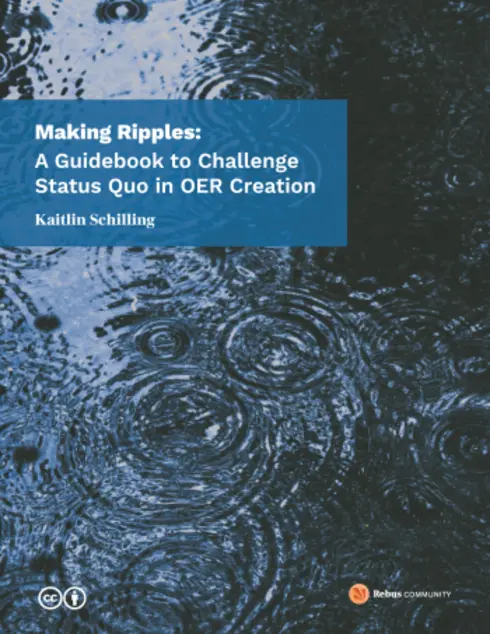
Making Ripples: A Guidebook to Challenge Status Quo in OER Creation
![]()
![]()
![]()
![]()
![]()
Kaitlin Schilling, Rebus Community
Copyright Year:
ISBN 13: 9781989014318
Publisher: Rebus Community
Language: English
Formats Available
Conditions of Use
![]() Attribution
Attribution
CC BY
Reviews
Reviewed by Melanie Mason, Adjunct Assistant Professor, University of Texas at Arlington on 3/29/24
This text is divided into five parts; purpose of OER creation: Storytelling in education; Equity minded pedagogy; Practices as community service and Beyond OER, allowing the reader to follow a logical path of development. Each part contains an... read more
![]()
![]()
![]()
![]()
![]()
Reviewed by Melanie Mason, Adjunct Assistant Professor, University of Texas at Arlington on 3/29/24
Comprehensiveness
This text is divided into five parts; purpose of OER creation: Storytelling in education; Equity minded pedagogy; Practices as community service and Beyond OER, allowing the reader to follow a logical path of development.
Each part contains an introductory section and a “Resource and Community” list “to engage more deeply with the topic & people”. Learning objectives, a “Pause and Reflect” list of questions, and an “Action Plan” component are included in the subsections to deepen involvement with the information presented and help implement content.
At 89 pages in length, this text is easy to engage with and written to be thought provoking about centering students and incorporating equitable practices. I believe it could be particularly helpful for a multidisciplinary or multicultural team that is considering creating an OER. It also links to other relevant OER textbooks.
Content Accuracy
The content appears to be accurate, error-free and unbiased, with timely resources referenced within each section. All were relevant and functioned properly. I especially appreciated the multitude of different voices, perspectives, and “out of the box” kinds of sources that were included.
Relevance/Longevity
The inclusion of sources and voices not often utilized in most mainstream American academia is very relevant, up to date, and quite frankly, refreshing. The text is written and arranged in a very easy-to-follow format that accommodates updates, and its CC BY attribution encourages opportunities for others writing OERs to modify and/or add chapters addressing relevant material as it occurs. There is also an active link to submit ancillary materials.
Clarity
One of the strengths of this text is sticking to its focus. It consistently asks the reader to think about the implications of decisions that are percolating or may have already been made and to revise those decisions in light of viewing the project through the lens of inclusion and equity. The author does, however, realize that readers may be in the early stages of development and creation of their OER and includes separate resources for those that might need more step by step instruction.
Consistency
The framework and terminology is consistent and clear.
Modularity
The author uses a scaffolding approach, orienting the reader through an introduction and building comprehension with each successive part. The text is available in many different file formats, “including PDF, EPUB (for eReaders), MOBI (for Kindles), and various editable files. The Digital PDF has passed the Adobe Accessibility Check.”
Organization/Structure/Flow
Each part is clearly labeled, the subsections are logically connected and are hyperlinked on the Content page, allowing for quick and easy navigation. The reflection and action exercises are set apart by consistent and attractive color blocking. Reference materials are annotated at the end of the section with extensive further reading following.
Interface
I encountered no navigation issues with any of the myriad of linked materials. Text, videos, podcasts (along with transcripts), H5P and Google worksheets all connected seamlessly.
Grammatical Errors
I found no grammatical errors
Cultural Relevance
As it calls for cultural reflection while creating an OER, this text is an excellence example in and of itself for inclusion. Diverse voices and backgrounds are featured and celebrated, both in the text and in resources.
Table of Contents
- Introduction
- Purpose of OER Creation
- Storytelling in Education
- Equity-minded Pedagogy
- Practices as Community Service
- Beyond OER
About the Book
Making Ripples: A Guidebook to Challenge Status Quo in OER Creation is a short resource designed to expand your understanding of inequities in the educational systems through breaking down the work into smaller pieces with opportunities for you to reflect, identify strategies for action, and locate resources and community members to connect with. The purpose of this guide is to explore strategies for you as OER creators to incorporate equitable practices into your workflows.
About the Contributors
Author
Kaitlin Schilling, Rebus Community
